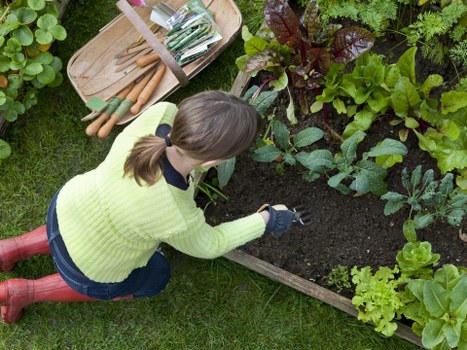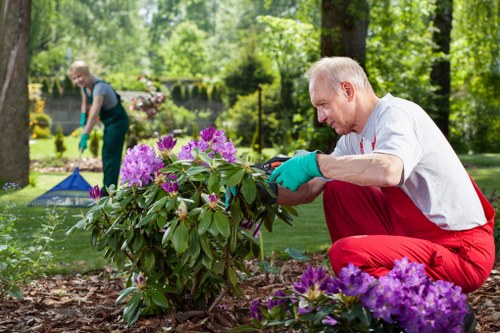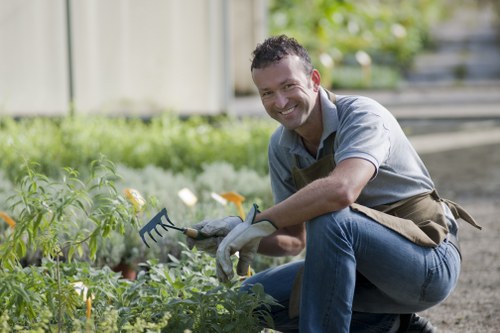Transform Your Outdoor Space with Landscape Gardening in Forest Hill

Welcome to the world of landscape gardening in Forest Hill, where your outdoor space can become a stunning extension of your home. Whether you're looking to create a serene garden retreat, a vibrant floral display, or a functional outdoor living area, Forest Hill offers the perfect backdrop for your gardening aspirations.
Forest Hill's unique climate and soil conditions provide an excellent environment for a diverse range of plants and garden designs. From native Australian flora to exotic species, the possibilities are endless. Understanding the local environment is key to successful landscape gardening, ensuring that your garden thrives year-round.
Embarking on a landscape gardening project can seem daunting, but with the right guidance and expertise, you can achieve a beautiful and sustainable garden. This article will guide you through the essential aspects of landscape gardening in Forest Hill, helping you create a space that is both aesthetically pleasing and functional.

Understanding Landscape Gardening
Landscape gardening involves the deliberate modification of the visible features of an area of land. It encompasses a variety of elements, including plants, hardscapes, lighting, and water features. The goal is to create a harmonious and balanced environment that enhances the natural beauty of the area.
In Forest Hill, landscape gardening takes on a unique character due to the region's natural beauty and diverse plant life. By blending native plants with carefully selected ornamental species, gardeners can create spaces that are both sustainable and visually appealing.
Successful landscape gardening requires careful planning and consideration of various factors such as soil quality, sunlight exposure, and water availability. Additionally, understanding the specific needs of different plant species is crucial to ensure their longevity and health.

Planning Your Garden
Proper planning is the foundation of any successful landscape gardening project. Start by assessing your outdoor space, taking note of existing features, soil conditions, and sunlight patterns. This will help you determine the best layout and plant selection for your garden.
Consider the following steps when planning your landscape garden:
- Define Your Goals: What do you want to achieve with your garden? Whether it's creating a space for relaxation, growing your own vegetables, or enhancing your property's curb appeal, having clear goals will guide your decisions.
- Assess the Site: Evaluate the size, shape, and existing elements of your outdoor space. Identify areas that receive full sun, partial shade, or full shade.
- Choose Your Plants: Select plants that are well-suited to Forest Hill's climate and soil conditions. Incorporate a mix of evergreen and deciduous plants for year-round interest.
- Design Layout: Create a balanced and cohesive design by arranging plants, hardscapes, and other elements in a way that complements the natural features of your property.

Selecting the Right Plants
Choosing the appropriate plants is crucial for a thriving landscape garden. In Forest Hill, you have access to a wide variety of native and exotic plants that can enhance the beauty of your outdoor space.
Native Plants: Native flora are well-adapted to the local climate and soil, making them easier to maintain and more resilient to pests and diseases. Examples include:
- Grass trees (Xanthorrhoea)
- Waratahs (Telopea speciosissima)
- Eucalypts
- Kangaroo paws (Anigozanthos)
Exotic Plants: Incorporating exotic species can add diversity and unique visual appeal to your garden. However, it's important to ensure that these plants can thrive in Forest Hill's conditions and do not become invasive.

Creating Hardscapes
Hardscapes are the non-living components of your garden, such as patios, walkways, retaining walls, and decorative features. They provide structure and functionality, enhancing the overall design of your landscape.
When designing hardscapes, consider the following:
- Materials: Choose materials that complement the natural surroundings and are durable enough to withstand Forest Hill's weather conditions.
- Functionality: Ensure that hardscapes serve a practical purpose, such as providing seating areas, defining pathways, or preventing soil erosion.
- Aesthetics: Select designs that enhance the visual appeal of your garden, incorporating elements like stone textures, colors, and patterns.

Maintaining Your Garden
Maintenance is essential to keep your landscape garden in Forest Hill looking its best. Regular care ensures the health of your plants and the longevity of your garden’s features.
Key maintenance tasks include:
- Watering: Provide adequate water to your plants, considering the specific needs of each species. Implementing a drip irrigation system can help conserve water and ensure efficient distribution.
- Pruning: Regular pruning helps maintain the shape and health of your plants, promoting better growth and preventing diseases.
- Weed Control: Keep your garden free from weeds, which can compete with your plants for nutrients and water.
- Soil Health: Test and amend your soil as needed to maintain its fertility and structure. Adding compost or mulch can improve soil quality and retain moisture.

Incorporating Sustainable Practices
Adopting sustainable gardening practices not only benefits the environment but also enhances the resilience and beauty of your garden. Here are some strategies to consider:
- Rainwater Harvesting: Collecting rainwater for irrigation reduces reliance on municipal water supplies and conserves water.
- Composting: Creating compost from kitchen scraps and garden waste provides a natural fertilizer for your plants.
- Native Plant Selection: As mentioned earlier, native plants require less water and maintenance, making them a sustainable choice.
- Organic Pest Control: Use natural methods to manage pests, such as introducing beneficial insects or using organic sprays.

Enhancing Your Garden with Water Features
Water features can add a sense of tranquility and elegance to your landscape garden. They serve as focal points and can attract wildlife, such as birds and butterflies, enhancing the biodiversity of your garden.
Popular water features include:
- Fountains: Provide a soothing sound and visual appeal.
- Ponds: Create habitats for aquatic plants and animals.
- Waterfalls: Add dynamic movement and sound to your garden.
- Birdbaths: Attract and provide water for birds, contributing to the garden’s ecosystem.
When incorporating water features, consider the maintenance requirements and ensure that the design complements the overall aesthetics of your garden.

Lighting Your Landscape
Proper lighting can transform your landscape garden, extending its usability into the evening and highlighting key features. It adds both safety and ambiance to your outdoor space.
Types of landscape lighting include:
- Path Lights: Illuminate walkways and paths, ensuring safe navigation at night.
- Spotlights: Highlight specific plants, trees, or architectural features.
- String Lights: Create a festive atmosphere, ideal for outdoor gatherings.
- Flood Lights: Provide broad illumination for larger areas or security purposes.
Energy-efficient options like LED lighting are recommended for their longevity and lower energy consumption.

Choosing Professional Landscape Gardening Services
While DIY gardening can be fulfilling, professional landscape gardening services in Forest Hill offer expertise and resources that can elevate your garden to the next level. Professionals can assist with design, plant selection, installation, and ongoing maintenance.
Benefits of hiring professionals include:
- Expertise: Professionals bring knowledge of local climate, soil conditions, and plant varieties.
- Time-Saving: Save time and effort by outsourcing complex tasks to experienced gardeners.
- Quality Results: Achieve a polished and cohesive garden design.
- Maintenance: Ongoing maintenance services ensure your garden remains healthy and beautiful.
If you're ready to transform your outdoor space, contact us today to schedule a consultation with our expert landscape gardeners in Forest Hill.

Seasonal Gardening Tips
Adapting your gardening practices to the changing seasons ensures your landscape garden remains vibrant throughout the year.
Spring: Focus on planting new flowers and shrubs, preparing soil beds, and fertilizing plants to encourage growth.
Summer: Implement effective watering strategies, provide shade for delicate plants, and control pests and weeds diligently.
Autumn: Clean up fallen leaves, mulch garden beds, and prepare plants for the colder months by pruning and protecting them from frost.
Winter: Plan for the next gardening season, protect sensitive plants, and maintain any hardscape features to withstand harsh weather.

Integrating Outdoor Living Spaces
Enhance your landscape garden by incorporating outdoor living spaces such as patios, decks, and pergolas. These areas provide functional spaces for relaxation, dining, and entertaining, blending seamlessly with your garden’s natural beauty.
Consider the following when designing outdoor living spaces:
- Placement: Position your living areas to take advantage of views, sunlight, and privacy.
- Materials: Use durable and weather-resistant materials that complement your garden’s design.
- Comfort: Incorporate comfortable seating, shade structures, and possibly outdoor heating for year-round use.
- Integration: Ensure that your outdoor living spaces harmonize with the surrounding landscape, using similar design elements and plantings.
Creating inviting outdoor living spaces can significantly enhance your enjoyment of your landscape garden.

Wildlife-Friendly Gardening
Designing your landscape garden to attract and support wildlife adds another layer of beauty and ecological value. Creating habitats for birds, butterflies, and beneficial insects promotes biodiversity and contributes to a healthy ecosystem.
Tips for wildlife-friendly gardening:
- Plant Diversity: Incorporate a variety of plant species to provide food and shelter for different wildlife.
- Water Sources: Install birdbaths, ponds, or small water features to provide drinking water for animals.
- Avoid Pesticides: Use natural pest control methods to protect beneficial insects and wildlife.
- Provide Shelter: Use shrubs, trees, and ground covers to create hiding spots and nesting areas.
By fostering a wildlife-friendly environment, your landscape garden becomes a vibrant and dynamic space.

Budgeting for Your Landscape Project
Planning and budgeting are essential components of a successful landscape gardening project. Establishing a clear budget helps you prioritize elements and make informed decisions.
Consider the following when budgeting:
- Design Costs: Professional design services may include consultations, plans, and layout designs.
- Materials: Allocate funds for plants, hardscape materials, tools, and other necessary supplies.
- Labor: If hiring professionals, factor in the cost of installation and ongoing maintenance services.
- Contingency: Set aside a portion of your budget for unexpected expenses or changes in plans.
By carefully planning your budget, you can achieve your landscape gardening goals without financial strain.

Leveraging Technology in Gardening
Modern technology offers numerous tools and resources to enhance your landscape gardening experience. From smart irrigation systems to gardening apps, technology can streamline maintenance tasks and provide valuable insights.
Popular technologies include:
- Smart Irrigation Systems: Automate watering schedules based on weather conditions and soil moisture levels.
- Gardening Apps: Access plant care guides, design tools, and maintenance reminders through mobile applications.
- Soil Sensors: Monitor soil health and nutrient levels to optimize plant care.
- Drones: Utilize drones for large-scale garden monitoring and aerial photography.
Incorporating technology into your gardening routine can increase efficiency and support the health of your landscape garden.

Conclusion: Your Dream Garden Awaits
Landscape gardening in Forest Hill offers endless opportunities to create a personalized and beautiful outdoor space. By understanding the local environment, planning thoughtfully, selecting the right plants, and incorporating sustainable practices, you can transform your garden into a thriving oasis.
Whether you're a seasoned gardener or just starting, professional landscape gardening services can provide the expertise and support you need to bring your vision to life.
Don’t wait to start your garden transformation. Contact us today and take the first step towards creating the landscape garden of your dreams in Forest Hill.